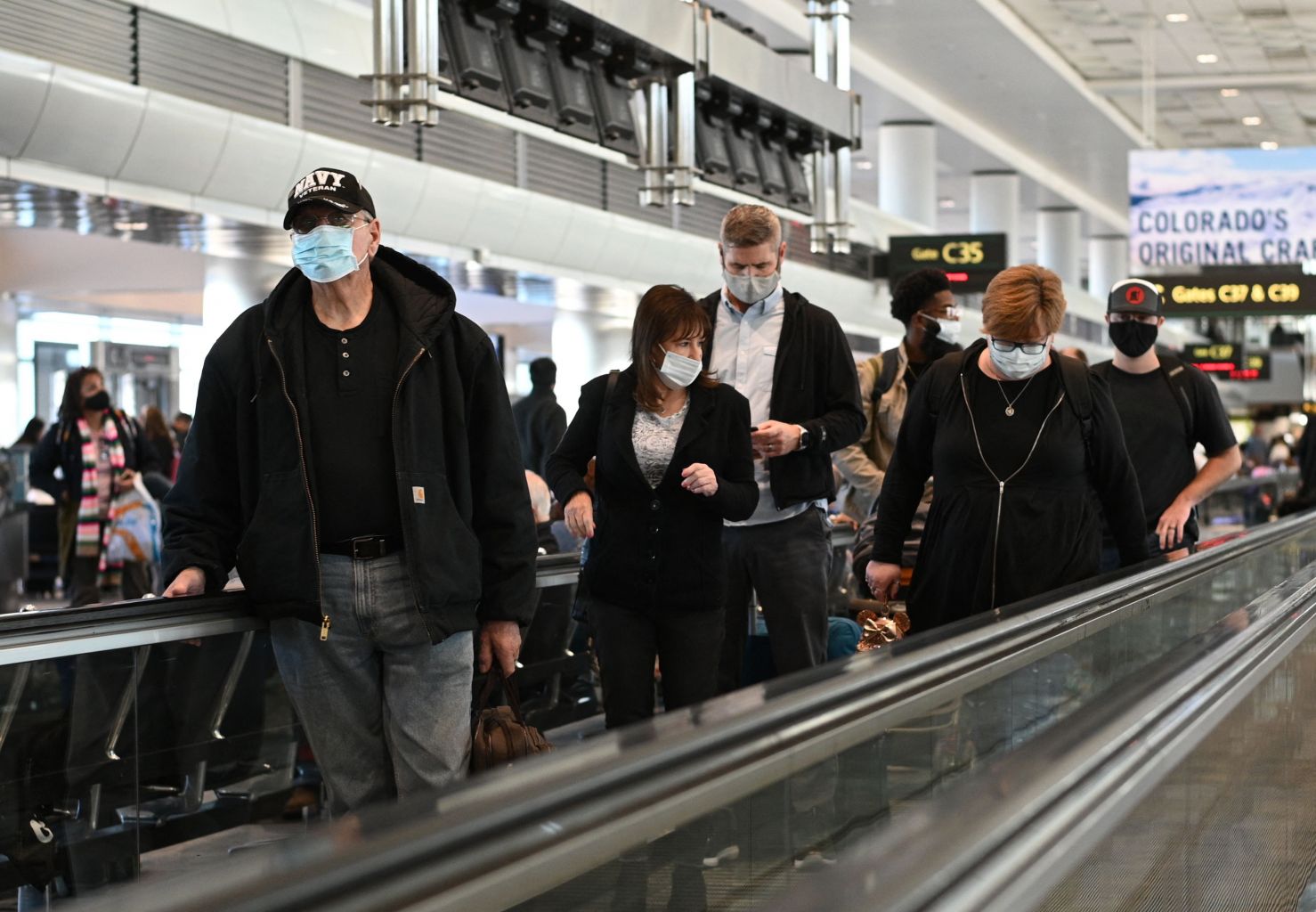Vaccines likely to protect against severe cases of Omicron, WHO scientist says
Sign up now: Get ST's newsletters delivered to your inbox

Travellers wear protective face masks at Denver International Airport in the US on Nov 30, 2021.
PHOTO: AFP
GENEVA (BLOOMBERG, AFP) - Vaccines will likely protect against severe Covid-19 cases from the new omicron variant, a World Health Organisation official said on Wednesday (Dec 1), seeking to ease concerns that the strain might get around the most effective tool for fighting the pandemic.
"We know that vaccines are likely to have some protection," WHO chief scientist Soumya Swaminathan said in a press briefing. "We still need to find out if there's any loss of protection, but we think vaccines will still protect against severe disease as they have against the other variants."
The WHO's statement is the latest in a series of efforts from health authorities to reassure the public on vaccines even as many questions about the new variant remain unanswered.
The companies behind the shots have roiled markets with statements that at times seemed contradictory, with Moderna's chief executive officer saying new shots might be needed. Both the University of Oxford, which helped develop the vaccine sold by AstraZeneca, and the head of BioNTech SE, Pfizer's vaccine partner, predicted some protection against Omicron from existing inoculations
The WHO also warned on Wednesday that the world was creating toxic conditions for new coronavirus variants like Omicron to emerge and then spread around the globe.
The WHO said the combination of low vaccination coverage across the planet and very low testing to track the virus was a fertile breeding ground.
The United Nations health agency stressed that measures to stop the globally dominant Delta variant would also hinder Omicron.
The new variant of concern has rattled countries around the world.
"We need to use the tools we already have to prevent transmission and save lives from Delta. And if we do that, we will also prevent transmission and save lives from Omicron," WHO director-general Tedros Adhanom Ghebreyesus told a press conference.
"But if countries and individuals don't do what they need to do to stop transmission of Delta, they won't stop Omicron either.
"Globally, we have a toxic mix of low vaccine coverage and very low testing - a recipe for breeding and amplifying variants.
"That's why we continue to urge countries to... ensure equitable access to vaccines, tests and therapeutics all over the world."
Omicron in 24 countries
Omicron was first reported to the WHO from South Africa on Nov 24, while the first known laboratory-confirmed case was identified from a specimen collected on Nov 9.
The Netherlands said on Tuesday it had found the variant in two samples taken on Nov 19 and 23, one from a person who had recently been to southern Africa and the other having no travel history.
Dr Maria Van Kerkhove, the WHO's Covid-19 technical lead, said timelines around first detection of Omicron may change as there was a backlog of sequencing of cases that occurred in November.
Dr Tedros said the WHO was taking the emergence of Omicron "extremely seriously", but added that the mutation "should not surprise us".
"This is what viruses do," he added. "And it's what this virus will continue to do, as we long as we allow it to continue spreading."
Dr Tedros said Omicron was in at least 24 countries - with that number expected to grow.
Dr Van Kerkhove said the WHO was not yet aware of any deaths associated with Omicron.
Transmissibility studies
The WHO said it could take several weeks to complete studies of Omicron to see if there are any changes in transmissibility, severity or implications for Covid-19 vaccines, tests and treatments.
"We expect to have more information on transmission within days; not necessarily weeks, but in days," said Dr Van Kerkhove.
"The more this virus circulates, the more infections there will be. The more infections there will be, the more people will die, and this is something that can be prevented."
Several countries have imposed travel bans on flights from South Africa, which Dr Van Kerkhove said was making it difficult to send samples from the country, even though it was willing to share them.
Dr Van Kerkhove said: "We will get out of this pandemic but every day, decisions need to be made on whether or not we're getting closer to the end of this pandemic or we're actually taking steps to prolong it."
Dr Michael Ryan, the WHO's emergencies director, said this was not the time for governments to be passing responsibility for management of the pandemic over to their citizens.
"Certainly, we are dealing with a crisis now - that crisis is in Europe and it's being driven by the Delta variant," he said.


